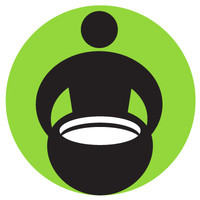This is part of a series on "The Future of Fair Trade," written in collaboration with Fair Trade USA. A 501 (c) (3) nonprofit organization, Fair Trade USA is the leading third-party certifier of Fair Trade products in the United States. To follow along with the rest of the series, click here.
There is a silent emergency in the world of coffee. It’s not an earthquake; it’s not a typhoon like the recent and horrific tragedy in the Philippines. This beast makes far less noise, and is almost invisible. Its effects will run deep for generations to come, beginning with the quick onset of chronic hunger, kids being pulled from school to work in the field, and a burgeoning question of whether or not it’s still viable to grow the world’s coffee.
It’s a “perfect storm” of a coffee crisis, one that should make us think twice about demanding the cheapest cup of joe that money can buy.
Two very important things happening in coffee:
1. Coffee leaf rust
In early 2013, several coffee producing countries--Honduras, Costa Rica and Guatemala among them--declared national states of emergency. The reason? A fast-spreading outbreak of coffee leaf rust, a disease that weakens and eventually kills coffee trees. As a result, farmers all the way from Mexico to Peru are seeing a significant loss in production and sales--an average of 25 percent in Central America alone.
Rust is also taking its toll on hired laborers--people who pick coffee but don't own the land. Agricultural economist Amy Angel estimates a loss of more than 500,000 jobs in Central America in 2013 due to rust, further exacerbating conditions of poverty, hunger, migration and hardship.
Of the world’s more than 25 million people producing coffee, the vast majority of them already face enormous challenges with food security. What have been deemed “los meses flacos” or “the lean months” just before the harvest, are not only getting harder, they're getting longer. It’s a dangerous situation, leading the UN World Food Programme to deploy mass aid in the form of food to farming communities across Central America.
WFP is concerned that this outbreak of coffee rust may turn into an acute and prolonged food security crisis for small coffee growers and their families. This may force workers to migrate internally or to other countries in the region to find jobs.” –WFP Deputy Regional Director for Latin America and the Carribbean, Alzira Ferreira
2. Plummeting coffee prices
If the first major blow is coffee rust, the second is the fact New York coffee market prices are free falling to historic lows. Hovering around $1 per pound, a price far below the cost of production, the average coffee farmer is now making significantly less than half of what he or she did two years ago.
Lower yields from plant disease, plummeting prices, and higher costs of production mean that farmers are not only unable to cope with things like the rust outbreak, they're actually struggling to survive.
We also know that quality and sustainability—two things that allow farmers to earn higher prices, are also negatively affected. These things take investment, and investment can’t happen when people are starving. The race to the bottom threatens livelihoods, and it threatens the ability to grow high-quality, responsible coffee.
Morale in our community is very low, and many families are struggling to keep up as their food, health, education and production are significantly affected.” –Paola Dessiré Sánchez López, independent small farmer, Honduras.
While many brands and consumers celebrate lower costs, it’s the farmers who are taking on the burden.
Is there a solution?
Though the effects of this disaster are widespread, and will require collaborative action from the entire coffee industry, there are ways to help. For example, you can support Fair Trade—the only certification with a price safety net for farmers.
When the market is low, the Fair Trade Minimum Price protects the producer from price exploitation. [It] guarantees a producer a minimum, no matter how low the coffee market goes.” Mauricio Velasquez, ASPROUNION, Colombia
Two things to know about Fair Trade:
- Minimum price: At $1.40 per pound, it creates stability for farmers when the market dips. It also serves as collateral to anchor lending, which is critical right now when additional money is needed to fight rust.
- Community development premium: An additional 20 cents per pound, this money funnels into a separate fund managed democratically by the farmers and workers themselves. With it, they can address critical problems in the community, especially those exacerbated by the crisis—i.e. food security, healthcare, organic production, and rust management.
With low coffee prices and the rust outbreak this year, which has gravely affected us, if we weren’t receiving the Fair Trade premium, producers would have already completely abandoned their farms and moved to the city.”-- Sandra Palacio, COOAGRONEVADA, Colombia
By supporting programs like Fair Trade, ESPECIALLY right now, you can make a tangible impact on coffee farming communities across the globe. If nothing else, it’s a way to show farmers and workers that you value their hard work, when the whims of Wall Street leave them behind.
Words of Wisdom
As we move into the final months of 2013, the perfect storm barrels on. With it, a most poignant reminder about the true cost of cheap food.
At a recent global convening in El Salvador called Let’s Talk Coffee, Gilbert Gitali of KZ NOIR in Rwanda was asked if he had any messages to share with consumers. He said, in the most powerfully succinct manner—“You need to pay more for your coffee.”

Fair Trade USA is a nonprofit organization that is the leading third-party certifier of Fair Trade products in the United States. Fair Trade USA audits and certifies transactions between U.S. companies and their international suppliers to guarantee that the farmers and workers producing Fair Trade Certified goods were paid fair prices and wages, work in safe conditions, protect the environment, and receive community development funds to empower and uplift their communities.














